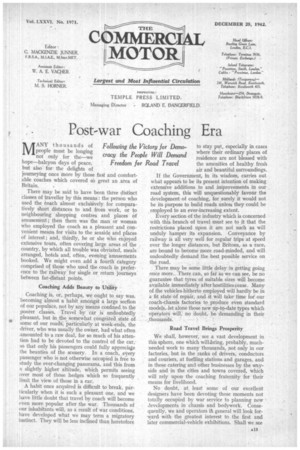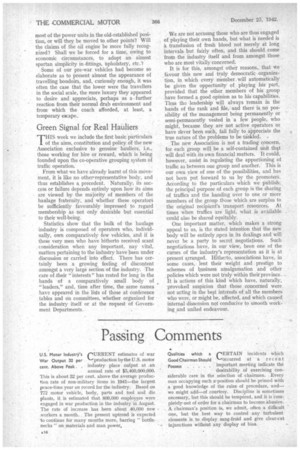Post-war Coaching Era
Page 17

Page 18

If you've noticed an error in this article please click here to report it so we can fix it.
MANY thousands of people must be longing not only for the—we hope—halcyon days of peace, but also for the delights of journeying once 'more by those fast and comfortable coaches which covered so great an area of Britain.
There may be said to have been three distinct classes of traveller by this means : the person who used the coach almost exclaively for comparatively short distances to and from work, or to neighbouring shopping centres and places of amusement ; then there was the man or woman who employed the coach as a pleasant and convenient means for visits to the seaside and places of interest ; and, thirdly, he or she who enjoyed extensive tours, often covering large areas of the country, by which all trouble was obviated, meals arranged, hotels and, often, evening amusements booked. We might even add a fourth category comprised of those who used the coach in preference to the railway for single or return journeys' between far-distant points.
Coaching Adds Beauty to Utility Coaching is, or, perhaps, we ought to say was, becoming almost a habit amongst a large section of our populace, not by any means confined to the poorer classes. Travel by car is undoubtedly pleasant, but in the somewhat congested state of • some of our roads, particularly at week-ends, the driver, who was usually the owner, had what often amounted to a raw deal, for so much of his attention had to be devoted to the control of the car,. so that only his passengers could fully appreciale the beauties of the scenery. In a coach, eyery passenger who is not otherwise occupied is free to study the ever-changing panorama, and this from a slightly higher altitude, which permits seeing over most of those hedges which so frequently limit the view of those in a car.
A habit once acquired is difficult to break, particularly when it is such a pleasant one, and we have little doubt that travel by coach will become even more popular after the war. Thousands of our inhabitants will, as a result of war conditions, have developed what we may term a migratory instinct. They will be less inclined than heretofore to stay put, especially in cases where their ordinary places of residence are not blessed with the amenities of healthy fresh air and beautiful surroundings.
If the Government, In its wisdom, carries out what appears to be its present intention of making extensive additions to and iniprovements in our road system, this will unquestionably favour the development of coaching, for ,surely it would not be its purpose to build roads unless they could be employed to an ever-increasing extent. Every section of the industry which is concerned with this branch of travel must see to it that the restrictions placed upon it are not such as will unduly hamper its expansion. Conveyance by railway is all very well for regular trips at speed over the longer distances, but Britons, as a race, are bound to become more road-minded, and will undoubtedly demand the best possible service on the road.
There may be some little delay in getting going once more. There can, so far as we can see, be no guarantee that tyres of suitable sizes will become available immediately after hostilities cease. Many of the vehicles hitherto employed will hardly be in a fit state of repair, and it will take time for our coach-chassis factories to produce even standard models, let alone those new up-to-date types which operators will, no doubt, be demanding in their _thousands.
Road Travel Brings Prosperity We shall, however, see a vast development in this sphere, one which will.bring, probably, muchneeded work to many thousands, not only in our factories, but in the ranks of drivers, conductors and couriers, at fuelling stations and garages, and in those catering and other businesses by the wayside and in the cities and towns covered, which will rely upon the coaching fraternity for their means for livelihood.
No doubt, at least some of our excellent designers have been devoting those moments not totally occupied by war service to planning new developments in chassis and bodywork. Consequently, we and operators ift general will look forward with the greatest interest to the first and later commercial-vehicle exhibitions. Shall we see most of the power units in the old-established position, or will they be moved to other points? Will the claims of the oil engine be more fully recognized? Shall we be forced for a time, owing to economic circumstances, to adopt an almost spartan simplicity in-fittings, Upholstery, etc.?
Some of our pre-war vehicles had become so elaborate as to present almost the appearance of travelling boudoirs, and, curiously enough, it was often the case that the lower were the travellers in the social scale, the more luxury they appeared to desire and appreciate, perhaps as a further reaction from their normal drab environment and from which the coach afforded, at least, a temporary escape.,
Green Signal for Real Hauliers
THIS week we include the first basic particulars of the aims, constitution and policy Of the new Association exclusive to genuine hauliers, i.e., those working for hire or reward, which is being founded upon the co-operative grouping system of traffic operation.
From what we have already learnt of this movement, it is like no other-representative body, and thus establishes a precedent. Naturally; its suceess or failure depends entirely upon how its aims are viewed by the majority of members of the haulage fraternity, and whether these operatork be sufficiently favourably impressed to regard membership as not only desirable but essential to their well-being.
Statistics show that the bulk of the haulage industry is composed of operators who, individually, own comparatively -few vehicles, and it is these very men who have hitherto received scant , consideration when any important, nay vital, matters pertaining to the industry have been under discussion or carried into effect. There has certainly been a growing feeling of discontent amongst a very large section of the industry. •The care of ,their "interests" has rested for long in the hands of a comparatively small body of "leaders," and, time after time, the same names have appeared in the lists of those at conference tables and on committees, whether organized for the industry itself or at the request of Government Departments. We are not accusing those who are thus engaged of playing their own hands, but what is needed is a transfusion of fresh blood not merely at long intervals but fairly often, and this should come from the industry itself and from amongst those who are most vitally concerned.
It is for this, amongst other reasons,. that we favour this new and truly democratic organization, in which every member will automatically be given the opportunity of playing his part, provided that the other members of his group have formed a good opinion as to his capabilities.
Thus the leadership will always remain in the hands of the rank and -file, and there is no possibility of the management being permanently or semi-permanently vested in a few people, who might, because they are not active operators or have riever been such, fail fully to akpreciate the true nature of the problems to be tickled.
The new Association is not a trading concern, for each group will be a self-contained unit th0 will deal with its own financial matters. It could, however, assist in regulating the apportioning of traffic as between one group and another. This is our own view of one of the possibilities, and has not been put forward to us by the promoters. According to the particulars which we publish; the principal purpose of each group is the sharing of traffics and the handing over to one or more members of the group those which are surplus to the original recipient's transport resources. At times when traffics are light, what is available could also be shared equitably.
One important matter, which makes a strong appeal to us, is the stated intention that the new body will be entirely open 'M its dealings and will never be a party to secret negotiations. Such negotiations have, in our view, been one of the curses of the industry's representation as it is at present arranged. Hitherto, association S have, in some cases, lent their weight and prestige to schemes of business amalgamation and other policies which were not truly within their province. It is actions of this kind which have, naturally-, provoked suspicion that those concerned were not acting in the best interests of all the members who were, or might be, affected, and which caused internal dissension not conducive to smooth working and united endeavour.




















































